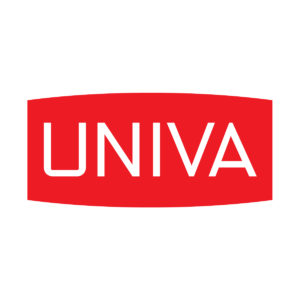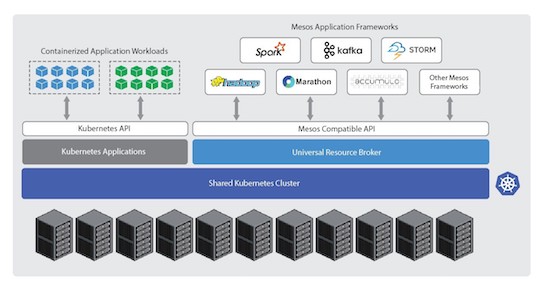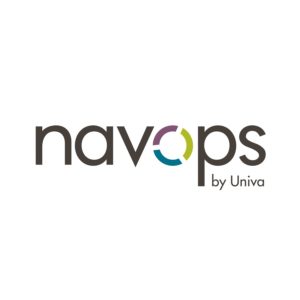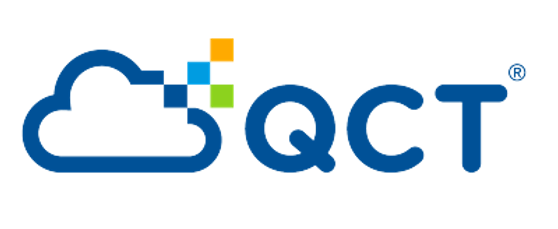 Today Univa announced the open source availability of the Universal Resource Broker (URB) adapter for Kubernetes. This new URB adapter will be of interest for organizations running Apache Mesos frameworks that are looking to deploy Kubernetes and Mesos workloads on a common infrastructure. The release of the URB adapter for Kubernetes marks a significant open source contribution by Univa and demonstrates its commitment to the Kubernetes community and to helping users get the most from their infrastructure investments.
Today Univa announced the open source availability of the Universal Resource Broker (URB) adapter for Kubernetes. This new URB adapter will be of interest for organizations running Apache Mesos frameworks that are looking to deploy Kubernetes and Mesos workloads on a common infrastructure. The release of the URB adapter for Kubernetes marks a significant open source contribution by Univa and demonstrates its commitment to the Kubernetes community and to helping users get the most from their infrastructure investments.
By using URB, users now may easily run Mesos compatible frameworks (including Spark, Hadoop, Storm, Jenkins, Marathon, and Chronos) along-side native Kubernetes applications and manage these services on a single Kubernetes cluster. URB implements the Mesos Scheduler API and Executor API and supports Mesos frameworks written in Java, Scala, Python, and C++.
The technology is easily deployable on a wide variety of Kubernetes environments including Red Hat OpenShift, Google’s GKE, Azure, Rancher, Tectonic and other Kubernetes distributions. URB will also be of interest to ISVs who have written application frameworks for Mesos APIs, but who wish to make their solutions available on Kubernetes without going to the expense of releasing a separate, Kubernetes specific version of their software.

URB allows users to run Mesos applications frameworks on Kubernetes seamlessly
According to Fritz Ferstl, CTO at Univa Corporation, “This contribution is significant for both the Mesos and Kubernetes communities. With Universal Resource Broker, customers and ISVs have new options to deploy Mesos applications alongside their micro service applications. URB simplifies enterprise environments and helps to fuel the continued growth of Kubernetes by enabling a broader set of application workloads.”
As a founding member of CNCF, Univa is pleased to bring this key technology to the container ecosystem.” said Rob Lalonde, General Manager of Univa’s Navops product line. URB provides our customers with yet another way to consolidate enterprise workloads, reducing cluster sprawl while protecting their existing IT investments.”
Users wishing to leverage or contribute to the URB effort can visit http://github.com/UnivaCorporation. The software is available under an Apache open source license. The project consists of the urb-core repository that exposes the Mesos compatible interface and the urb-k8s repository that provides the Kubernetes adapter. A separate open source urb-uge enables Univa Grid Engine users to run Mesos applications natively on Grid Engine clusters, taking advantage of sophisticated Grid Engine scheduling policies. Detailed documentation is provided for URB and for its Kubernetes adapter along with packaged examples showing how environments like Spark, Marathon, and other Mesos frameworks can be easily run on Kubernetes using URB.
 The URB technology complements Univa’s Navops Command, an advanced, enterprise-proven policy management solution for Kubernetes that supports multi-tenancy, mixed workloads (containerized and non-containerized) and brings new capabilities such as application workflows to Kubernetes. With URB and Navops Command, Univa supports the widest variety of container and non-container based application workloads on a common, shared Kubernetes environment.
The URB technology complements Univa’s Navops Command, an advanced, enterprise-proven policy management solution for Kubernetes that supports multi-tenancy, mixed workloads (containerized and non-containerized) and brings new capabilities such as application workflows to Kubernetes. With URB and Navops Command, Univa supports the widest variety of container and non-container based application workloads on a common, shared Kubernetes environment.
For more information, visit www.navops.io, or stop by booth #300 at the Open Source Summit in Los Angeles.



